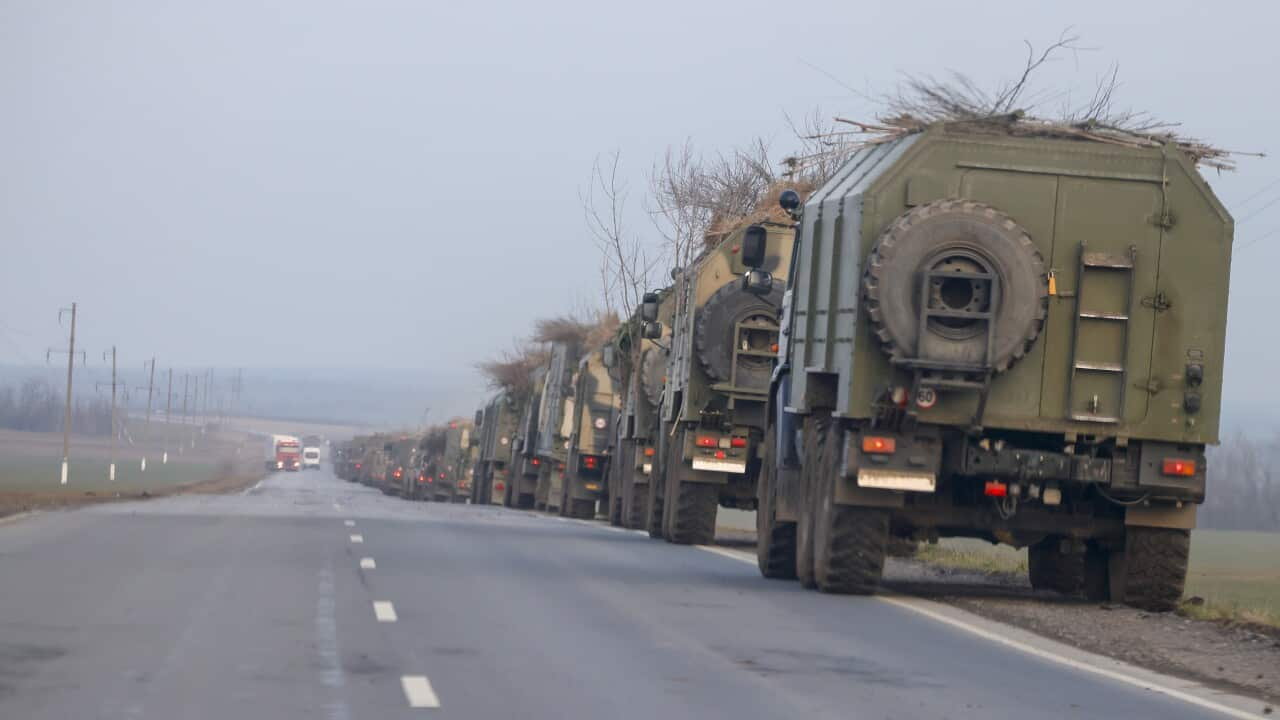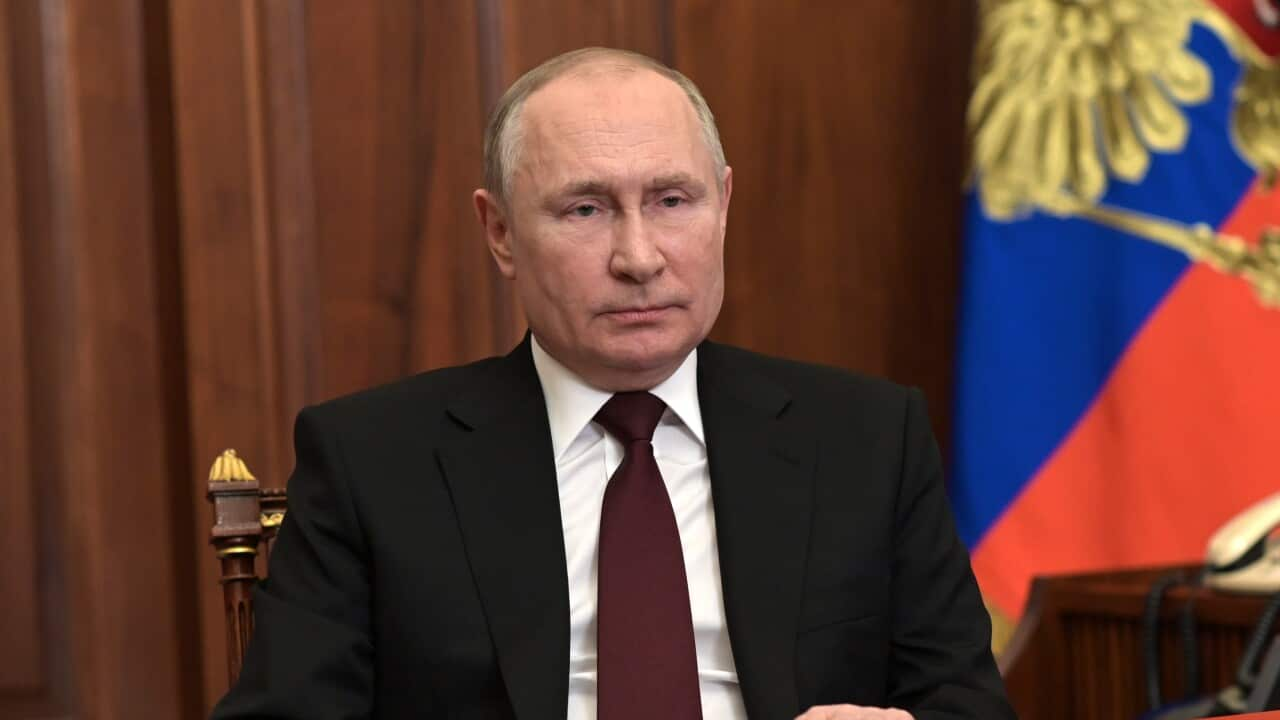Ukraine has declared a state of emergency and Moscow said separatists in the east had asked for help to repel "aggression" as the United States stepped up efforts to deter an all-out invasion by imposing fresh sanctions.
Shelling has intensified in the east, where Russian President Vladimir Putin has recognised two separatist regions in Ukraine - Donetsk and Luhansk, together known as Donbas - as independent and ordered the deployment of what he called peacekeepers and the West says is the beginning of an invasion.
Convoys of military equipment, including nine tanks, moved towards eastern Ukraine's Donetsk from the direction of the Russian border, a Reuters witness reported.
But there was still no clear indication of whether Mr Putin will launch a massed assault on Ukraine with the tens of thousands of troops he has gathered near the border.
A United States defence official said the Russian forces were "as ready as they can be" for an attack, after US President Joe Biden said on Tuesday the invasion is "beginning".
But administration officials say that do not yet have evidence that Russian forces have crossed the border into Ukraine.
The leaders of the two breakaway areas have sent Mr Putin "a request to provide help to repel aggression from the armed forces of Ukraine," Russian news agencies quoted Kremlin spokesperson Dmitry Peskov as saying on Wednesday.
Photos of separate appeals from the heads of the two separatist areas were also posted by Tass.

Ukrainian police officers stand guard in front of the Russian Embassy in Kyiv, Ukraine, Wednesday, 23 February, 2022. Source: AP / Emilio Morenatti
Asked about the move, White House spokesperson Jen Psaki said: "As we've said from the beginning, there are going to be a range of false flag operations that we have expected to - and laid out the playbook - to see.
"This is an example of it. That is suggesting that they feel under threat. By whom? The Ukrainians that the Russians are threatening to attack?"
Ukraine's 30-day state of emergency could restrict the freedom of movement of conscripted reservists, see curbs imposed on the media and lead to personal document checks, according to a draft text that needs to be approved by parliament.
The restrictions would come into force from Thursday.

A damaged building in Vibrovka village after shelling, near the pro-Russian militants controlled city of Luhansk, Ukraine, on 23 February 2022. Source: EPA / Zurab Kurtsikidze
Ukrainian government and state websites, which have experienced outages in recent weeks blamed by Kriv on cyber attacks, were again offline on Wednesday. Ukraine's parliament, cabinet and foreign ministry websites were affected.
Moscow denies planning an invasion and has described warnings as anti-Russian hysteria. But it has taken no steps to withdraw the troops deployed along Ukraine's frontiers.
Sanctions
Western countries have been warning for weeks about the possibility of the bloodiest war in Europe for decades. That has not materialised yet but the apparent threat remains, leaving policymakers to struggle with calibrating their response.
Along with allies Washington has unveiled a volley of sanctions this week, including new restrictions on some Russian banks.
Western leaders say tougher measures are in reserve in case of a full-scale invasion, for example if Russia helps separatists seize parts of eastern Ukraine they claim but do not currently control.

Ukrainian servicemen near the Katerynivka village not far from pro-Russian militants controlled city of Luhansk, Ukraine, on 23 February 2022. Source: EPA / ZURAB KURTSIKIDZE/EPA
Mr Biden said his administration will impose sanctions against Nord Stream 2 AG, a Swiss firm which built Russia's Nord Stream 2 gas pipeline to Germany and whose parent is Russian state-owned gas giant Gazprom.
The sanctions will target the firm and it's corporate officers.
"These steps are another piece of our initial tranche of sanctions in response to Russia's actions in Ukraine. As I have made clear, we will not hesitate to take further steps if Russia continues to escalate," Mr Biden said.
Germany on Tuesday froze approvals for the pipeline.
The European Union will add all members of Russia's lower house of parliament who voted to recognise the separatist regions in Ukraine to a blacklist, freezing their assets. A second EU sanction package would include export controls.
EU leaders will also hold an emergency summit on Thursday to discuss next steps.
Britain banned Russia from issuing new bonds in its markets.
Fresh troops deployed
Ukraine's military said one soldier had been killed and six wounded in increased shelling by pro-Russian separatists using heavy artillery, mortar bombs and Grad rocket systems in the two breakaway areas over the previous 24 hours.
New satellite imagery showed several fresh troop and equipment deployments in western Russia and more than 100 vehicles at a small airfield in southern Belarus, which borders Ukraine, according to US firm Maxar.
For months, Russia has presented the crisis mainly as a dispute with the West, demanding security guarantees, including a promise never to allow Ukraine to join NATO.
But the recognition of the separatist regions was accompanied by much stronger language against Ukraine, including personally from Mr Putin.
In a TV address on Monday, Mr Putin rambled across centuries of history to characterise the Ukrainian state as an artificial construct wrongly carved out of Russia by its enemies.
Some who saw the speech said they now feel menaced by a leader making decisions which no longer appear rational.
"In the case of Putin, this is not a struggle for money or power: It's about pride. Which means the mind is switched off. He can't stop, and he can't be stopped," said Lilia, 72, a pensioner in the Kyiv suburb of Brovary.
German Foreign Minister Annalena Baerbock said Russia was heading down a path that would make it a global pariah, urging it not to "completely isolate yourself worldwide".
Diplomacy has now faltered. US Secretary of State Antony Blinken and French Foreign Minister Jean-Yves Le Drian cancelled separate meetings with Russian Foreign Minister Sergei Lavrov. A summit between US President Joe Biden and Mr Putin, floated by France at the start of the week, now seems unlikely.
Mr Putin said he was always open to finding diplomatic solutions but that "the interests of Russia and the security of our citizens are unconditional for us."













